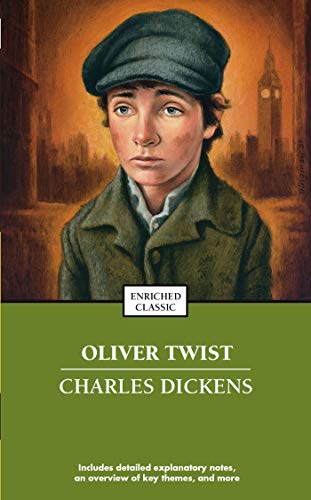Oliver Twist (Enriched Classics)
Charles Dickens
BOOK REVIEW

In the world of literature, few works resonate as deeply as Oliver Twist, a timeless masterpiece by Charles Dickens. This novel is not just a tale of a young orphan navigating the grim realities of 19th-century London; it's a profound exploration of the human condition, a relentless critique of societal injustices, and a beacon for change. Dickens, a man shaped by personal hardships and the industrial revolution's chaotic tides, channels his indignation into Oliver's heartbreaking journey. Through his words, we are transported to a world where poverty, crime, and innocence collide in the most poignant ways.
As you delve into the pages of Oliver Twist, each turn reveals the harrowing plight of an innocent boy grappling with an unforgiving society. From the very moment Oliver utters his famous plea for more, "Please, sir, I want some more," you become ensnared in his struggles. This singular moment encapsulates not just Oliver's desperation, but the collective outcry of countless children marginalized and forgotten. Dickens doesn't just tell a story; he serves up a clarion call, urging readers to witness the plight of the downtrodden.
What makes Oliver Twist truly electrifying is its unflinching look at the moral decay of society. Through characters like the menacing Fagin and the sinister Bill Sikes, Dickens paints a vivid portrait of evil that is as compelling as it is terrifying. These figures represent the darker facets of humanity - ambition gone awry, greed, and the exploitation of the vulnerable. In the world of Oliver, the line between right and wrong blurs, forcing readers to confront uncomfortable truths about morality and ethical choices.
Critics and fans alike have remarked on Dickens' ability to blend humor and tragedy masterfully. His clever wit shines through, providing moments of levity amidst the darkness. The vibrant cast of characters-from the scheming Artful Dodger to the compassionate Mr. Brownlow-serves to cover the spectrum of human experience. Each character is crafted with meticulous detail, resonating with readers both in Dickens' time and today, as they grapple with their own societal issues.
The 19th century setting of Oliver Twist provides fertile ground for discussion. It was an era defined by stark social stratification, child labor, and an evolving understanding of human rights. Dickens, influenced by his own experiences of poverty, highlights these issues in stark relief. In so doing, he compels us to examine our societal structures and their impact on the vulnerable. Reading this book today prompts a necessary reflection on our world: What has changed? What remains the same?
The excitement surrounding Oliver Twist is palpable in the diverse opinions it has garnered. Some readers express frustration at the reoccurring motifs of suffering and injustice, while others find them deeply moving and reflective of a brutal reality. Many laud Dickens for his capacity to instill empathy in readers, effectively using Oliver's innocence as a mirror to society's failings. The emotional rollercoaster that ensues grips readers at their core-testament to Dickens' prowess as a storyteller.
But let's not shy away from the controversies. Critics of Dickens sometimes argue that the melodrama detracts from the story's realism, suggesting that simplistic depictions of good versus evil undermine the complexity of human morality. Yet, isn't that precisely why this novel endures? The exaggerated characters and dramatic plot serve as gateways for us to engage with profound moral questions and societal critiques.
As you turn the pages of this enriched classic, each chapter serves as an emotional jolt, compelling you to confront your own beliefs and values. Oliver Twist isn't merely a story; it's a heartfelt lamentation, a plea for justice and compassion in a world that often feels cruel and indifferent. The events of the novel echo beyond its text, resonating in contemporary discussions surrounding poverty and social justice.
In sum, Dickens offers you more than a narrative; he presents a compelling case for empathy and change. To miss Oliver Twist is to sidestep a crucial exploration of humanity itself. Grab your copy, immerse yourself in Oliver's perilous journey, and confront the questions that arise with every page turned. The urgency of Dickens' message is not just for historical acknowledgment; it's a challenge for you to reflect on today. This is not just literature; it's a movement towards understanding and compassion. Don't let the opportunity to connect with this seminal work pass you by. 🌍✊️
📖 Oliver Twist (Enriched Classics)
✍ by Charles Dickens
🧾 672 pages
2007
#oliver #twist #enriched #classics #charles #dickens #CharlesDickens